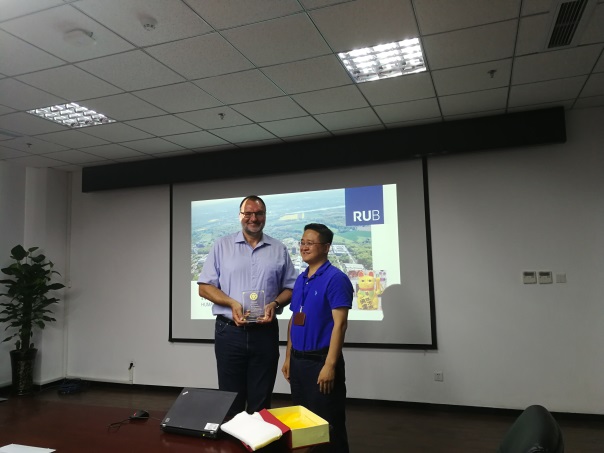Prof. Martin Muhler Speaks on QIBEBT Distinguished Expert Forum
On August 14, Prof. Matain Muhler from Ruhr-Universitat Bochum was invited to the “QIBEBT Distinguished Expert Forum” of the Qingdao Institute of Bioenergy and Bioprocess Technology (QIBEBT), Chinese Academy of Sciences (CAS). Prof. Lv Xuefeng, the deputy director of QIBEBT, attended this forum and presented Prof. Martin Muhler with the Lecture Award.
On the forum, Prof. Muhler delivered a lecture entitled ”Supported Pd and Pt catalysts applied in hydrogenation and oxidation”, which was hosted by Prof. LI Xuebing.
In the lecture, Prof. Muhler briefly introduced the history and development status of Ruhr-Universitat Bochum at first, and then systematically introduced the research progress of selectively hydrogenation of ethylene and catalytic oxidation of ethanol using carbon nanotube as support, which are being studied in his group in recent years. The related work includes the modification of carbon nanotube, the method to prepare supported noble metal catalysts with high dispersion degree, catalyst characterization, and kinetics study.
Based on the characterization results, reaction data and molecule stimulation technique, Prof. Muhlar explained in detail the catalysis conversion process of different reactants and the catalytic mechanism of nanotube in those reactions. After the lecture, Prof. Muhlar further communicated with audience about catalysis process and catalyst in depth.

Figure: Prof. Muhler and Prof. Lv Xuefeng (Image by LI Shuangju)
Martin Muhler studied chemistry at the Ludwig-Maximilians-Universitat in Munich from 1980 to 1986. He moved to Berlin to the Fritz-Haber-Institute of the Max-Planck-Society (FHI) joining Prof. Dr. G. Ertl’s group as PhD student. He received his PhD in 1989 from the Freie Universitat Berlin. He joined Haldor Topsoe A/S in Denmark as a postdoctoral fellow from 1989 to 1991. He returned to Prof. Ertl’s Department of Physical Chemistry as head of the group “Heterogeneous Catalysis” and finished his habilitation in Industrial Chemistry in 1996 (Technische Universitat Berlin). In 1996 he was appointed full professor in Industrial Chemistry at the Ruhr- Universitat Bochum, where he still is. Since 2015, he is also the Max Planck Research Fellow at Max Planck Institue for Chemical Energy Conversion.
His research is focused on heterogeneous redox catalysis comprising selective reduction and oxidation, electrocatalysis and photocatalysis. Syngas catalysis is a major topic on which he has been working for more than 20 years. His number of publications is around 450 (h-index of 65). He is a member of the International Advisory Boards of ChemCatChem, ChemSusChem, and the State Key Laboratory of Catalysis at the DICP in Dalian. He is the German representative in the European Federation of Catalysis Societies (EFCATS) and in the International Association of Catalysis Societies (IACS). Since 2014 he is the Chairman of the German Catalysis Society (GeCatS).
(Text by LI Guangci )